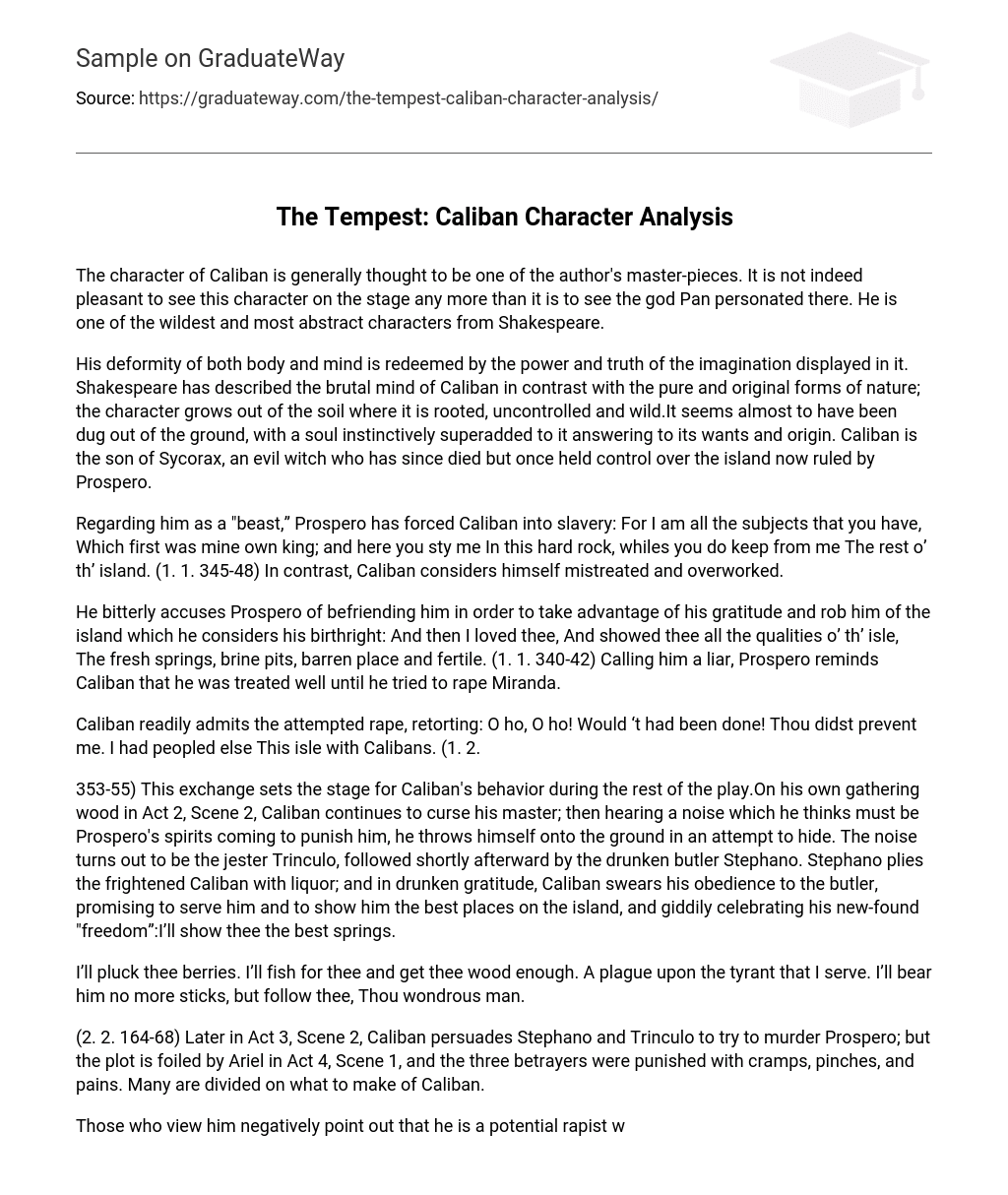The character of Caliban is generally thought to be one of the author’s master-pieces. It is not indeed pleasant to see this character on the stage any more than it is to see the god Pan personated there. He is one of the wildest and most abstract characters from Shakespeare.
His deformity of both body and mind is redeemed by the power and truth of the imagination displayed in it. Shakespeare has described the brutal mind of Caliban in contrast with the pure and original forms of nature; the character grows out of the soil where it is rooted, uncontrolled and wild.It seems almost to have been dug out of the ground, with a soul instinctively superadded to it answering to its wants and origin. Caliban is the son of Sycorax, an evil witch who has since died but once held control over the island now ruled by Prospero.
Regarding him as a “beast,” Prospero has forced Caliban into slavery: For I am all the subjects that you have, Which first was mine own king; and here you sty me In this hard rock, whiles you do keep from me The rest o’ th’ island. (1. 1. 345-48) In contrast, Caliban considers himself mistreated and overworked.
He bitterly accuses Prospero of befriending him in order to take advantage of his gratitude and rob him of the island which he considers his birthright: And then I loved thee, And showed thee all the qualities o’ th’ isle, The fresh springs, brine pits, barren place and fertile. (1. 1. 340-42) Calling him a liar, Prospero reminds Caliban that he was treated well until he tried to rape Miranda.
Caliban readily admits the attempted rape, retorting: O ho, O ho! Would ‘t had been done! Thou didst prevent me. I had peopled else This isle with Calibans. (1. 2.
353-55) This exchange sets the stage for Caliban’s behavior during the rest of the play.On his own gathering wood in Act 2, Scene 2, Caliban continues to curse his master; then hearing a noise which he thinks must be Prospero’s spirits coming to punish him, he throws himself onto the ground in an attempt to hide. The noise turns out to be the jester Trinculo, followed shortly afterward by the drunken butler Stephano. Stephano plies the frightened Caliban with liquor; and in drunken gratitude, Caliban swears his obedience to the butler, promising to serve him and to show him the best places on the island, and giddily celebrating his new-found “freedom”:I’ll show thee the best springs.
I’ll pluck thee berries. I’ll fish for thee and get thee wood enough. A plague upon the tyrant that I serve. I’ll bear him no more sticks, but follow thee, Thou wondrous man.
(2. 2. 164-68) Later in Act 3, Scene 2, Caliban persuades Stephano and Trinculo to try to murder Prospero; but the plot is foiled by Ariel in Act 4, Scene 1, and the three betrayers were punished with cramps, pinches, and pains. Many are divided on what to make of Caliban.
Those who view him negatively point out that he is a potential rapist who plots to commit murder. They observe that he foolishly trades one master (Prospero) for another (Stephano) and that his so-called “wish for freedom” turns out to be a desire for the self-indulgence he obtains through Stephano’s wine. Some can argue that Prospero and Miranda are intruders on the island, and that by choosing to serve Stephano rather than accept Prospero’s education and enslavement, Caliban practices a measure of self-determination.





